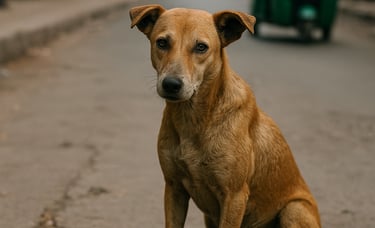Noida Launches Stray Dog Vaccination Drive, Seeks Support from Local Feeders to Boost Campaign
In a major step towards animal welfare and public health, Noida authorities have rolled out a vaccination drive for stray dogs across the city. To ensure maximum reach and efficiency, officials are teaming up with local dog feeders who regularly interact with community strays. The initiative aims to control the spread of rabies, safeguard residents, and provide better care for the city’s growing stray population.


By: Bharat Daily Samachar Daily: 16 Sep,2025
Noida Launches Stray Dog Vaccination Drive, Seeks Support from Local Feeders to Boost Campaign
Noida has taken a significant step in the direction of animal welfare and public safety by starting a large-scale vaccination drive for stray dogs. The initiative, launched by the local administration in collaboration with animal welfare organizations, aims to protect both humans and animals from the spread of rabies and other infectious diseases. What makes this campaign unique is the active involvement of local dog feeders, who play a key role in identifying and bringing strays for vaccination.
This effort comes at a time when urban India is witnessing a sharp rise in stray dog populations, which has also led to increasing concerns over dog bites and the transmission of rabies. By combining public health measures with compassion for animals, Noida is setting an example that other cities across the country can follow.
Why the Vaccination Drive is Important
Rabies remains a major public health concern in India. According to health experts, the country accounts for almost 36% of the world’s rabies deaths, with thousands of cases reported each year. Since stray dogs are the most common carriers of the rabies virus, vaccination becomes the most effective way to prevent outbreaks.
For Noida, a city with a growing human and stray dog population, this campaign is crucial. It not only aims to bring down the risk of rabies but also improves the overall well-being of stray animals, many of whom suffer from preventable diseases. Officials have confirmed that the drive is not a one-time measure but will continue in phases to ensure maximum coverage across all sectors and residential areas.
Role of Local Dog Feeders
One of the biggest challenges in such drives is catching and vaccinating strays. Stray dogs are often fearful of unknown people, making it difficult for authorities to manage them. To solve this, the administration has reached out to community dog feeders—residents who regularly provide food to stray dogs in their neighborhoods.
These feeders are familiar faces to the dogs and can help gain their trust, making it easier to vaccinate them without stress or harm. By involving local feeders, the administration is also promoting community participation, ensuring that the campaign is more humane and effective.
Animal activists have welcomed this approach, saying it bridges the gap between stray dogs and society while also educating citizens about the importance of responsible coexistence.
Ensuring Humane Treatment
Past attempts to control stray dog populations in different parts of the country have sometimes led to inhumane practices such as mass culling or forceful relocation. Noida’s current initiative, however, is built on the principle of compassion and responsibility.
All dogs vaccinated under the drive are being tagged or marked to avoid duplication and to track their health status. Medical teams are also conducting health check-ups for strays, addressing issues like skin infections, malnutrition, and injuries.
This humane approach ensures that the vaccination drive not only protects people but also contributes to the welfare of the animals themselves.
Public Awareness and Participation
Along with vaccination, the authorities are also running an awareness campaign to educate residents about rabies prevention, the importance of sterilization, and the need to treat stray animals with kindness. Posters, local announcements, and social media updates are being used to spread the word.
Schools and resident welfare associations (RWAs) have also been roped in to create awareness among children and families. Many residents are volunteering to assist medical teams, highlighting the growing recognition of stray dogs as part of the community rather than a nuisance.
Long-Term Goals of the Initiative
While the current focus is on vaccination, Noida’s long-term plan includes:
Sterilization Programs: To humanely control the stray dog population and prevent unchecked breeding.
Dedicated Health Camps: Regular health check-ups and treatment for community dogs.
Public-Private Partnerships: Collaborating with NGOs and corporate sponsors for funding and logistics.
Community Engagement: Building stronger bonds between citizens and stray animals for peaceful coexistence.
Experts believe that if implemented consistently, these measures can transform Noida into a model city for animal welfare and public health.
Challenges Ahead
Despite the positive response, challenges remain. Ensuring coverage across every sector, dealing with aggressive or fearful dogs, and securing adequate funding for vaccines are some of the hurdles that the authorities will need to address. Moreover, sustaining public interest and participation over time is crucial to the campaign’s long-term success.
Animal welfare groups have also stressed the importance of follow-up vaccinations, as rabies shots need regular boosters to remain effective. Ensuring this continuity will be key in making the drive a permanent success.
A Step Towards Safer and Kinder Cities
The launch of the Noida stray dog vaccination drive is not just about public health—it is also about creating a more humane society. By recognizing the role of local feeders, prioritizing animal welfare, and focusing on preventive care, the city is setting an example for urban India.
As heavy urbanization continues to put pressure on both people and animals, such compassionate and practical measures highlight the possibility of peaceful coexistence. The hope is that other metropolitan areas will take inspiration from Noida and replicate similar initiatives.
In the end, this campaign is a reminder that the health of humans and animals is deeply interconnected. Protecting one means protecting the other, and through initiatives like this, cities can build safer, healthier, and kinder communities for all.
